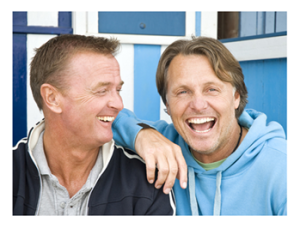We worry about our calorie and carb intake. We furrow our brows over missing a day of exercise. We grumble through our self-imposed health “musts” and quite possibly, miss an easy opportunity to enhance well-being.
We’ve all heard the expression “laughter is the best medicine” – and if there’s truth to that? And scientific research to back it up?
Laughter makes us feel better. We know that. We feel it. Our bodies tighten, then loosen and relax. We smile broadly after a gargantuan guffaw.
But there’s more to laughter than meets the eye – or the smiling lines around it.
So why is laughter so good for us, exactly?
Belly, or Belly Laugh?
I have a dear friend who makes me laugh. Really laugh. Big, bold, bubbling up from deep in the gut belly laughs, and sometimes I find myself doubled over as tears are pouring down my cheeks.
If the gaiety goes on for 10 or 20 minutes or even longer? Afterward, I feel twinges in my stomach muscles. I’m certain my laugh lines have etched themselves a millimeter deeper – but I don’t care! I experience a heightened sense of well-being that may last for hours.
Laughter is the Best Medicine
According to an article on WebMd,
… if people can get more laughter in their lives, they are a lot better off… Yet researchers aren’t sure if it’s actually the act of laughing that makes people feel better. A good sense of humor, a positive attitude, and the support of friends and family might play a role, too.
So. Is it the laughter itself that’s doing us some good? Or is this another chicken and the egg scenario, where laughter is a consequence of positive attitude or social support systems, and that’s what positions us for better health?
Laughter and Physiological Effects
The WebMD article goes on to explain the physiological changes that take place in the body when we laugh, suggesting that hearty laughter provides a mild workout.
Maciej Buchowski, a researcher from Vanderbilt University, conducted a small study in which he measured the amount of calories expended in laughing. It turned out that 10-15 minutes of laughter burned 50 calories.
Well sign me up for that one!
(S)he Who Laughs Last?
 As reported in the New York Times last fall, research may indeed confirm that a champion chortler is improving his or her health. The exertion involved in laughter releases those all-important endorphins that boost our mood and, by the way, reduce pain.
As reported in the New York Times last fall, research may indeed confirm that a champion chortler is improving his or her health. The exertion involved in laughter releases those all-important endorphins that boost our mood and, by the way, reduce pain.
Yes. Reduce pain!
So along with a healing massage as a non-invasive means to reduce certain types of pain, should we follow up with a 15-minute session in front of a kick-ass classic comedy?
Bring on the Laugh Lines
In addition to referencing a study that explicitly tested for pain reduction, the New York Times writes:
The simple muscular exertions involved in producing the familiar ha, ha, ha… trigger an increase in endorphins, the brain chemicals known for their feel-good effect.
I’m feeling like a good giggle even as I continue my reading on the subject. Then again, at the moment, I’m alone. And it takes a great deal more to provoke a chuckle or a chortle when that’s the case, whereas laughter comes more easily when in the company of others.
What’s up with that, anyway?
Why We Laugh
While I’ve wondered if humor is genetic, I’ve never actually asked myself why we laugh. Well, not seriously. Like most parents, I’m well aware that laughter comes long before language. Who hasn’t delighted in their infant’s giggles? So what is it that triggers laughter in humans?
WebMd offers some answers, though apparently, it’s all more complex than we realize.
“Most laughter is not in response to jokes or humor,” says Robert R. Provine, a professor of psychology and neuroscience at the University of Maryland Baltimore County.
Dr. Provine is the author of Laughter: A Scientific Investigation, and has conducted numerous studies on laughter, its effects, and why we laugh. From his research, he concludes that only a small portion of our laughter is the result of jokes; some, certainly, is learned (social) behavior. But laughter is instinctual, it predates language as a means of communication, it doesn’t seem to be under our conscious control, and:
Humans are hardwired for laughter.
Laugh Lack, Laugh Track
To complicate things further, let’s not forget there’s the tentative titter on one end of the spectrum, and that belly laugh my friend gets out of me – on the other. We also experience laughing contagion (in elevators?), the villainous cackle, and other sorts of snorts and snickers.
 Occasionally, what would normally provoke peals-to-tears garners nothing. Nada. Bubkus. So call in the laugh track!
Occasionally, what would normally provoke peals-to-tears garners nothing. Nada. Bubkus. So call in the laugh track!
I’ll Take the Upside
Personally, I’ll take all positive signs that my laugh lines indicate good health – and more to come. I’m going to focus on that full body belly buster that provides the benefits of raising pulse, working abs, and increasing the flow of oxygen to my brain.
Pass the script for a daily dose of social side effects, while we’re at it. If it’s easier to get and give laughter in the company of others, I’ll haul my ready-to-rock-n-roll silly side out into public, a little more often.
You May Also Enjoy

I don’t laugh nearly often enough. Part of it is just being serious by nature but I also think it is a side effect of living outside my culture – British humour just doesn’t tickle me.
Oh Shelley – I love British humor (humour)! Of course, it depends… Classic Monty Python in the right mood is, well, glorious. But I do find that some of the most side-splitting scenes come in real life – from a child, from a friend who knows exactly where to engage your funny bone.
Does Bill make you laugh?
In acting, it’s very hard to be funny. What people find funny, my wise old acting teacher once said, is attitude.
And timing.
I knew my marriage was over when my husband told the children (and anyone else who would listen) that I didn’t have a sense of humor. When the laughter was gone, it was well-nigh over.
P.S.
Knock, knock.
Who’s there?
Interrupting cow.
Interrupting cow w—MOO!
(Couldn’t resist.)
Suzicate just blogged about laughter too, so what I said to her applies here. I remember in my youthful days those fits of laughter that brought tears to my eyes and could cause leaks in other orifices. Those are few now, but when they happen they are wonderful. As to lines? Yes, I have some from laughter, I have several from the years of living, and I have the most from being a tooth clencher. Lines are medals of honor, proving you have lived this life.
Medals of honor. I like that, Carol.
I love life with my six year old. She is always reminding me of the sheer joy of those deep belly laughs.
Children can really provide such joy, can’t they? (Especially before those hormones kick in!) 😉
Laughter is the best thing about children…that do it easily, wildly, and freely!
I always feel better after laughing. The people I love being with the most make me laugh.
I guess there is something to the ” live, love, laugh”!
Loved this post, BLW!
Comedy has a lot of anxiety in it—we get hurt and it’s tragedy, but someone else gets hurt (in a cinematic experience) and it’s comedy… and we partly laugh out of anxious identification and partly out of relief that this is not us at this moment. The other big fountain of laughter is humiliation for similar reasons. This is humor in theater and film, as opposed to evolutionary biology. Whatever it all means, laughing is certainly one of life’s best experiences. And with The Artist getting so much praise this year anyone who bothers to check out old classic Charlie Chaplin and Buster Keaton will be amazed at just how funny it still is after close to a century.
Here’s to LOL at silent movies.